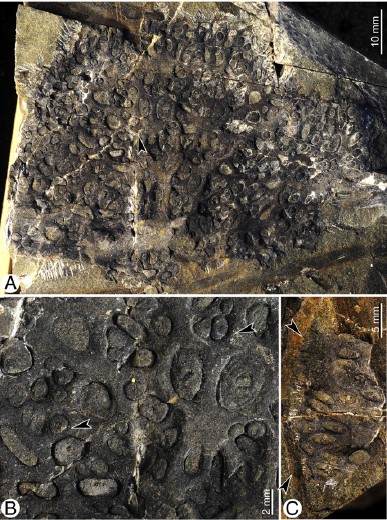
the lycopsid cormose rhizomorph from the Middle Devonian of North Xinjiang, the whole specimens the partial enlargement.
Lycopsids have the longest evolutionary history among extant vascular land plants. The group originated in the late Silurian from herbaceous forms, peaked in both diversity and abundance in the Carboniferous when arborescent forms dominated tropical coal swamps, and they have extant herbaceous counterparts such as Isoetes L. The lycopsids are a monophyletic group with various growth forms in the Devonian and Carboniferous. The Middle Devonian witnessed the first appearance of forests, with, among others, arborescent rhizomorphic and/or heterosporous lycopsids.
The Middle Devonian was also the key period for the evolution and diversification of lycopsids in terms of growth forms and increasing diversity. The characterization of the rhizomorphs is important for interpreting the evolution and taxonomy of lycopsids. However, well-preserved Devonian lycopsid rhizomorphs are rare. Recently, Prof. XU Honghe and Prof. WANG Yi from Nanjing Institute of Geology and Palaeontology, Chinese Academy of Scineces recognized a cormose rhizomorph of probable lycopsid affinity from the upper Middle Devonian (c. 387 Ma) of West Junggar, Xinjiang, Northwest China. They suggested that by the Middle Devonian, rhizomorphic lycopsids had diversified and different types of lycopsid rooting systems had developed. The cormose rhizomorph might have had an earlier origination than previously thought.
Related information: Xu H-H, Wang Y, 2016. The earliest cormose rhizomorph of putative lycopsid affinity from the Middle Devonian of West Junggar, Xinjiang, China.Review of Palaeobotany and Palynology226, 54–57. doi:10.1016/j.revpalbo.2015.12.005
